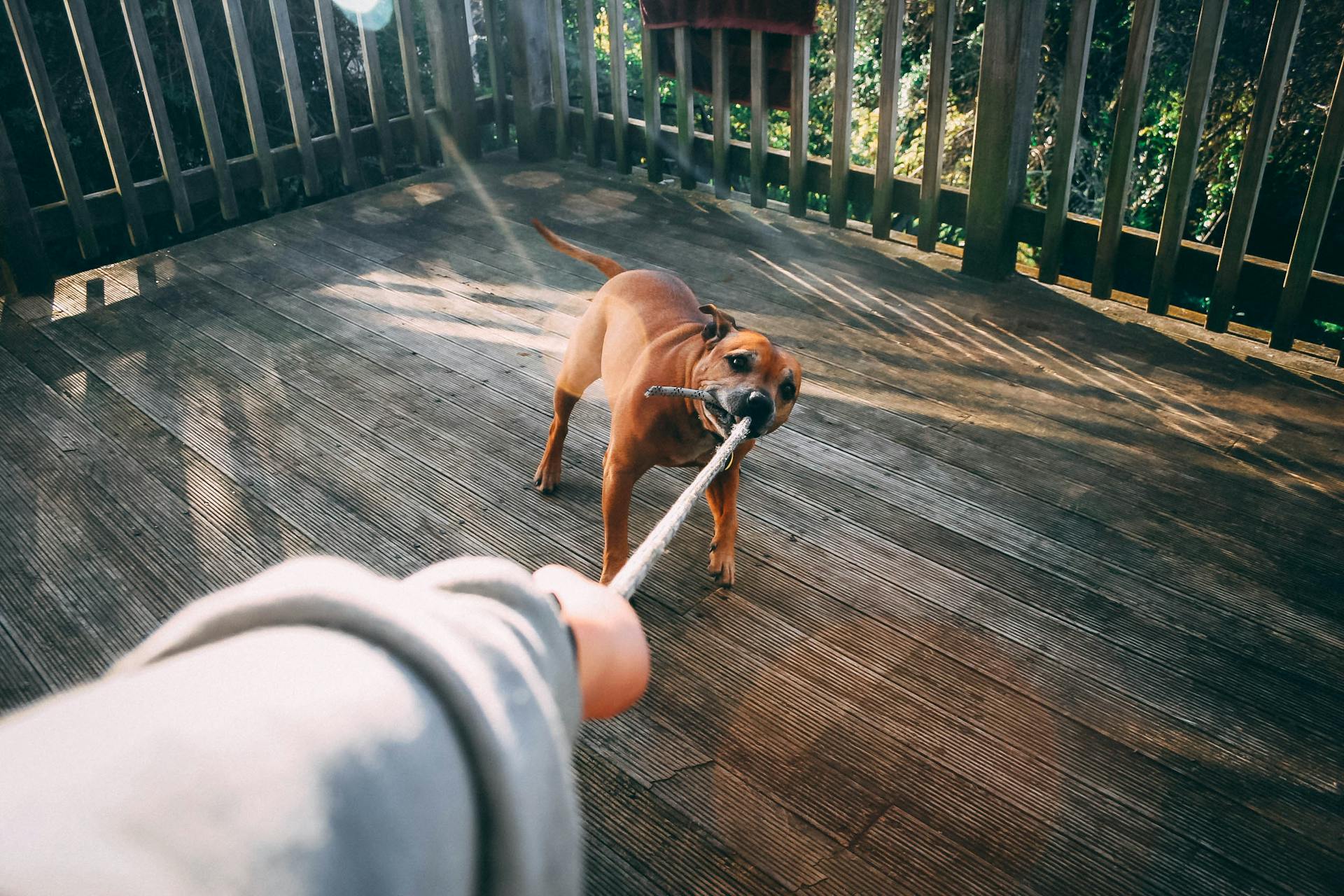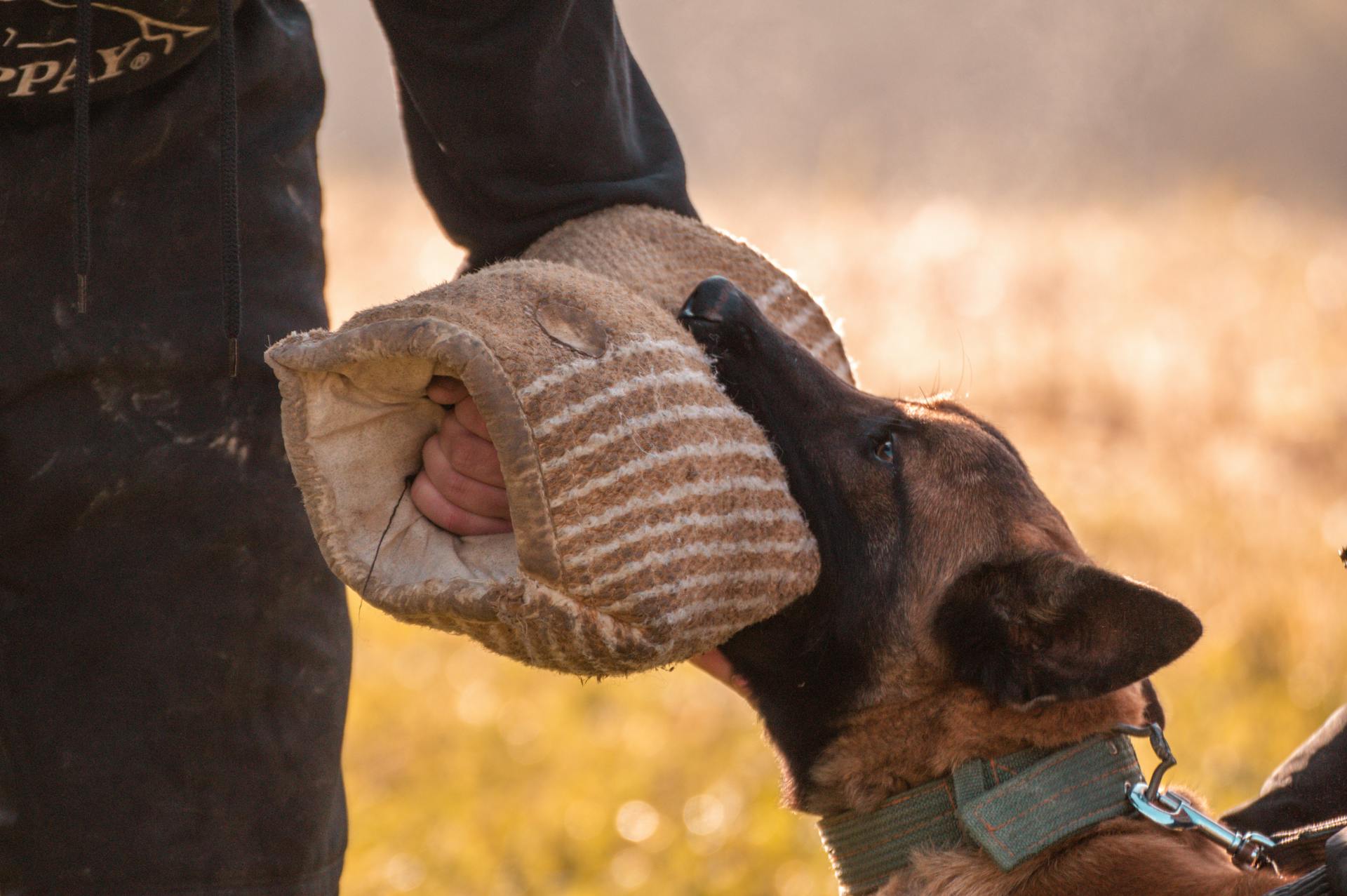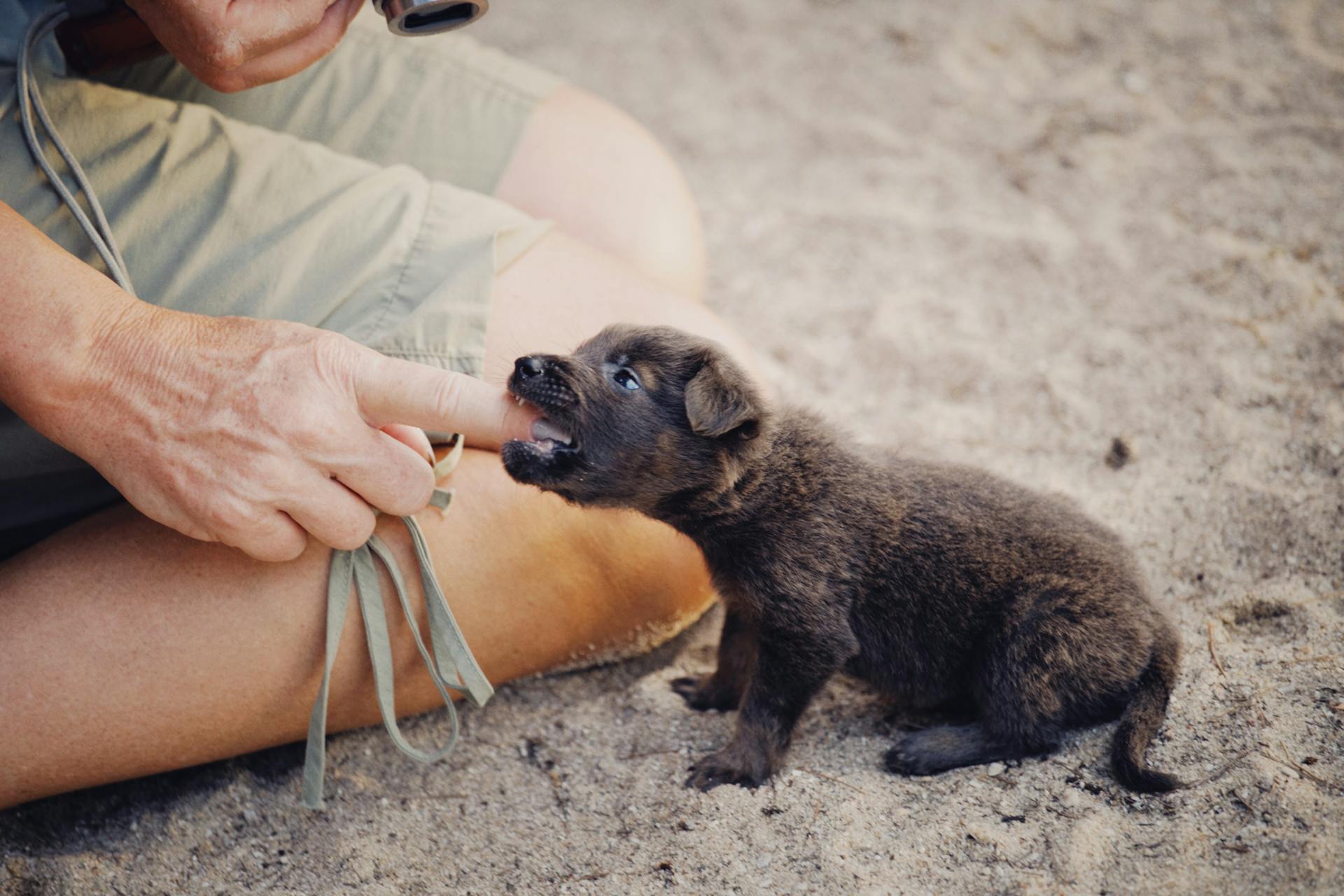
Filing a dog bite insurance claim can be a daunting task, but understanding the process can make it less overwhelming.
First, you'll need to notify your insurance company as soon as possible after the incident. This can usually be done by calling their customer service number or submitting a claim online.
It's essential to provide as much detail as possible when reporting the incident, including the date, time, location, and a description of the incident. This will help your insurance company to process your claim more efficiently.
Your insurance company will then assign an adjuster to investigate the claim and determine the extent of the damages.
Check this out: Insurance Claims Processing
Before Filing a Claim
Before filing a claim, it's essential to take immediate action to document the incident and gather evidence. File a claim with the dog owner's insurance as soon as possible, providing details about the incident, your injuries, and any witnesses.
To strengthen your claim, gather evidence such as photographs of the injuries, information about the dog and its owner, and witness statements. Take pictures of the injuries as soon as possible after the attack and continue taking photos as they heal.
You might like: Does Health Insurance Cover Motorcycle Accident Injuries
Gather all necessary documentation, including medical records, information about the dog owner, and details about the attack. Keep records of all correspondence with the insurance company or dog owner, as this will help you track the progress of your claim.
Here's a list of essential documents to collect:
- Photographs of the injuries
- Information about the dog and its owner
- Witness statements
- Medical records
- Information on missed work or activities
This evidence will help you build a strong case and ensure you receive fair compensation for your injuries and other damages related to the dog bite.
Gathering Evidence
Gathering evidence is a crucial step in building a strong insurance claim after a dog bite injury. Be prepared to document everything, including photos of your injuries and any damage to property.
It's essential to take pictures of your injuries as soon as possible after the attack. This will help demonstrate the severity of your wounds and show how they've healed over time. Take multiple photos, and continue to update them as your injuries progress.

Get as much information as you can about the dog and its owner, including their full name, address, and insurance details. Note the dog's breed, age, name, and whether it was on a leash. You can also request copies of the dog's medical records, license, and any records of previous aggressive behavior.
Witness statements are also vital in gathering evidence. Ask anyone who saw the attack to provide a written account, including as many details as possible about the dog, owner, and events leading up to and following the bite.
Medical records are another essential piece of evidence. Obtain copies of records from any doctors, hospitals, or other medical professionals you visited for treatment. This should include information on the procedures performed, medications prescribed, and prognosis for recovery.
You should also keep records of any time you missed from work or usual activities due to injury or medical care. This can include pay stubs, invoices, or letters from your employer or clients.
Contact Us Promptly

Contact us promptly after a dog bite incident to ensure a smooth claim process.
You should file a claim with the dog owner's insurance within 1-2 business days of the incident.
Gather important details about the incident, including the dog breed, your injuries or damages, and any witnesses.
Be prepared to provide a detailed account of events when contacting the insurance company.
Prompt notification is key to a favorable dog bite insurance claim.
Having the right lawyer can ensure that the insurance claim is filed with all the necessary details to maximize your compensation.
A lawyer can also guard against common pitfalls in the claim process.
Contacting the insurance company as soon as possible will help determine fault in your dog bite case.
You will need to submit certain documents to support your claim, so it's essential to ask about the claim process when you contact the insurance company.
Don't hesitate to seek medical attention and then file a claim with the insurance company - it's a crucial step in pursuing compensation.
Readers also liked: Workers Compensation Employers Liability Coverage
Filing a Claim
Filing a claim with the dog owner's insurance company is the first step in seeking compensation for your dog bite injuries. You should file a claim with the homeowners or renters insurance of the dog owner as soon as possible.
To do this, provide details about the incident, your injuries, and any witnesses. The insurance company will investigate your claim and determine if the dog owner is legally liable for your damages. Be prepared with any documentation you've gathered, but also be cautious not to say too much without proper legal representation.
It's essential to notify the insurance company promptly, as this can impact the outcome of your claim. Choose a lawyer who knows the nuances of dealing with insurance companies to ensure your claim is filed with all the necessary details to maximize your compensation.
For more insights, see: Insurance Claim Payout
File with Owner
Filing a claim with the dog owner's insurance is often the first step in seeking compensation for your damages. You should start by contacting the insurance company and providing them with details about the incident, your injuries, and any witnesses.
The insurance company will investigate your claim and determine if the dog owner is legally liable for your damages. This process can take some time, so be patient and follow up as needed.
To strengthen your position, it's a good idea to have legal counsel on your side. If the insurance company denies your claim or offers an unfair settlement, a lawyer can help you navigate the situation and advocate for your rights.
Take a look at this: Claim Insurance Company
How to File
Filing a claim with the dog owner's insurance company is a crucial step in seeking compensation for your damages.
You should file a claim with the dog owner's homeowners or renters insurance as soon as possible. Provide details about the incident, your injuries, and any witnesses.
Prompt notification is key to a favorable dog bite insurance claim. Be prepared with any documentation you've gathered.
To file a claim with the dog owner's insurance company, you will need to gather important details about the incident. Contact the insurer as soon as possible.
Having legal counsel will strengthen your position if the insurance company denies your claim or offers an unfair settlement.
Filing a claim starts with notifying the insurance company, whether it's a homeowner's or renter's insurance.
Gather any documentation you've collected, including medical bills and witness statements.
Readers also liked: How to File Insurance Claim against Other Driver without Insurance
Understanding the Process
In Florida, dog owners face strict liability for injuries caused by their dogs, which can result in settlements as high as $75,000.
Over 4.5 million dog bites occur annually across the US, making it essential to understand your insurance policy details.
Knowing your policy details is crucial in states like Florida, where most homeowners and renters insurance include provisions for dog bites, which can cover medical expenses, lost wages, and legal defense.
If a bite occurs, not all policies are created equal, and the fine print can hold crucial information, such as limitations and exclusions that could affect your coverage.
Children under 5 are the most susceptible to dog bites, so it's vital for parents to be well-equipped with knowledge about their policy to ensure they have robust coverage in place.
You might enjoy: Business Owners Insurance Definition
Documenting Your Injuries
Documenting your injuries after a dog bite is critical for filing an insurance claim. Photographs, medical records, and other evidence will strengthen your claim and help ensure you receive fair compensation.
Photographs of the injury are a crucial part of the documentation process. They should be taken as soon as possible after the incident and can help establish the extent of the injury.
Medical records are also essential for documenting your injuries. These records will show the treatment you received and any ongoing medical issues related to the dog bite.
Gathering all documentation related to the incident is crucial for a successful insurance claim. This includes photos of the injury, medical records, information about the dog owner, and details about the attack.
Keep records of all correspondence with the insurance company or dog owner. This will help you stay organized and ensure that you don't miss any important deadlines or information.
Take a look at this: Does Bodily Injury Cover Pain and Suffering
Investigation and Settlement
The investigation process for a dog bite insurance claim can be lengthy and complex. The insurance company may ask for additional information, conduct interviews with involved parties, or request to see the injury.
You should not be surprised if the insurance company prioritizes their bottom line over your well-being. After all, they are a business.
Navigating the investigation process can be challenging, but having an experienced attorney by your side can make a big difference. They can guide you through the process and help ensure you receive fair compensation.
Insurance companies often prefer to settle claims out of court, but this should not be rushed. The compensation you receive should reflect the impact of the bite, both physically and emotionally.
At a smaller firm like Bengal Law, we put an emphasis on your story and needs, ensuring that the compensation you receive is fair and just.
Recommended read: What Does Liability Insurance Cover If You're Not at Fault
Avoiding Common Pitfalls
Hiring a personal injury lawyer can guide you through the complex claims process and help ensure you receive fair compensation.
Saying too much to the insurance company can be a major pitfall, as it may be used against you in your claim.

It's essential to steer clear of initial offers too quickly, as they might not be in your best interest.
Not understanding your policy comprehensively can lead to missed opportunities for compensation.
Filing an insurance claim right away, after seeking medical attention for your dog bite injury, is crucial to pursue compensation for your medical bills, lost wages, pain and suffering, and other related expenses.
The attorneys at Fletcher Law have extensive experience helping clients file personal injury claims after sustaining dog bite injuries, and can guide you through the necessary steps.
Their small case loads translate into focused, undivided attention for you and your claim.
For another approach, see: Hospital Professional Liability Insurance
Maximizing Compensation
Maximizing your compensation in a dog bite insurance claim requires patience and a thorough understanding of your policy.
Comprehensive documentation of your injuries is crucial, so be sure to keep detailed medical records and first aid documentation.
Over 80% of dog bite victims know the dog owner, so gathering a history of the dog's behavior can serve as valuable evidence.
For another approach, see: Does Apartment Building Insurance Have Dog Bite
Building a Strong Case
Maximizing your compensation in a dog bite claim requires a solid foundation of evidence. This includes detailed medical records that document your injuries and treatment.
Evidence is your strongest ally in a dog bite claim, and it's essential to gather as much as possible. This can include photos of the injuries and the scene, as well as witness statements.
Since over 80% of dog bite victims know the dog owner, there might also be a history of the dog's behavior that can serve as evidence. At Bengal Law, Jeff will help you assemble all pieces of the puzzle to form a compelling narrative for your claim.
Comprehensive documentation of your injuries is crucial in building a strong case. This includes first aid documentation and a thorough understanding of your policy.
Average Cost
The average cost of a dog bite claim is a staggering $49,000, according to State Farm's data. This is a significant expense that can be broken down into various components, including medical bills, legal fees, pain and suffering, and lost wages.
Medical bills are a major contributor to the high cost of dog bite claims. In fact, the average cost per claim has increased significantly over the years, from $39,017 in 2018 to $49,558 in 2020.
The average cost per claim varies from year to year, but it's consistently high. For example, in 2019, the average cost per claim was $43,912, while in 2021, it was $49,025.
Here's a breakdown of the average cost per claim for the past few years:
Dog bite claims are one of the most expensive homeowners insurance claims to settle, with an average cost of more than three times the cost of the average wind or hail claim, and more than eight times the average theft claim.
Insurance and Policy
Over 4.5 million dog bites occur annually across the US, making it essential to understand your insurance policy's coverage. Most homeowners and renters insurance include provisions for dog bites, which can cover medical expenses, lost wages, and legal defense up to the limits of your liability coverage.
In Florida, dog owners face strict liability for injuries caused by their dogs, and settlements can be as high as $75,000. Your insurance coverages should act as a safety net, not a convoluted trap.
Dog bites can have long-term effects, such as anxiety or PTSD, particularly when children are involved. Ensuring you have robust coverage in your insurance policy that accounts for these effects is pivotal in guarding your financial and emotional welfare.
A mere 20% of victims receive compensation, but with adequate legal representation, you could be part of that essential percentile. Your insurance company may make changes to your policy to reflect the increased risk after a dog bite claim.
In the worst case scenario, your home insurance policy won’t be renewed at all, in which case you should use an insurance marketplace to compare coverage and rates with other insurance companies.
Additional reading: Figo Pet Insurance Cancellation Policy
Liability and Laws
There are 38 states with strict liability laws for dog bites, meaning the dog owner is always liable, regardless of circumstances.
If you live in one of these states, you may not need as much liability coverage as you would in a state with negligence laws. However, it's essential to know your state's laws to determine the right level of coverage for you.
Local laws vary depending on where you live, but there are three general types of legislation governing liability for dog owners: dog bite statute, one-bite rule, and negligence laws.
Here's a breakdown of each type of liability:
If you're unsure about your state's laws or need help navigating the process, consider hiring a personal injury lawyer who specializes in dog bite law and insurance claims.
Contacting the Owner
You'll need to contact the dog owner's insurance company as soon as possible to file a claim. This will involve gathering important details about the incident.
To start, you'll want to file a claim with the dog owner's homeowners or renters insurance. Provide all the necessary information, including details about the incident, your injuries, and any witnesses.
You should aim to contact the insurance company right away, as this will help ensure a smoother claims process.
Worth a look: Should I File Claim with My Auto Insurance or Theirs
Contact Animal Control
Contacting animal control is a crucial step after a dog bite incident. Report the incident to your local animal control department or humane society.
Provide details about the attack and the aggressive dog, including any relevant information that may be used to investigate the dog owner. This may involve determining if the dog has bitten anyone else.
Obtaining copies of any reports or citations issued can be helpful for your records. This documentation can be useful in evaluating the one bite rule for liability in a dog bite case.
Photographs, medical records, written details, and witness statements can all be used to provide credibility to your experience and support your insurance claim.
A unique perspective: Animal Control
Does
Does your homeowners insurance cover a dog bite lawsuit? Yes, it can help pay legal and medical fees if you end up being sued after a dog bite. Coverage falls under the personal liability portion of a homeowners insurance policy, but your insurance company may not necessarily cover your dog.
Explore further: Does Homeowners Insurance Cover Dog Bites off Property
Does homeowners insurance cover dog bites to other dogs? Yes, your homeowners insurance can cover the cost if your dog bites another dog and they need to go to the vet or the other owner decides to sue you.
Does your homeowners insurance cover dog bites to guests or visitors? Yes, your medical payments coverage can help pay for things like an ambulance and necessary first aid if your dog bites a guest or visitor in your home.
Does your homeowners insurance cover property damage caused by your dog? Yes, liability coverage can help pay for the property damage if your dog damages someone else's property.
There are 38 states that have some form of strict liability laws for dog bites, often referred to as Statutory Strict Liability States. These states include Alabama, Arizona, California, Colorado, Connecticut, Delaware, District of Columbia, Florida, Georgia, Hawaii, Illinois, Indiana, Iowa, Kentucky, Louisiana, Maine, Maryland, Massachusetts, Michigan, Minnesota, Missouri, Montana, Nebraska, New Hampshire, New Jersey, New York, North Carolina, Ohio, Oklahoma, Oregon, Pennsylvania, Rhode Island, South Carolina, Tennessee, Utah, Washington, West Virginia, and Wisconsin.
Some dog breeds may be excluded from some homeowners insurance policies if companies consider them higher risk. These breeds include Akitas, Alaskan Malamutes, any wolf breeds, Chow chows, Doberman pinschers, German shepherds, Great Danes, Pit bulls, Presa Canarios, Rottweilers, Siberian huskies, and Staffordshire terriers.
Here are some states that ban dog breed discrimination:
- Illinois
- Nevada
- New York
Frequently Asked Questions
How much compensation do you get for a dog bite?
Compensation for a dog bite varies based on the severity of the injury and its long-term effects. The amount of compensation you receive will be determined on a case-by-case basis.
Sources
- https://www.fletcherlawusa.com/blog/dog-bite-claims-how-to-file-an-insurance-claim/
- https://bengallaw.com/navigating-insurance-claims-for-dog-bites/
- https://www.policygenius.com/homeowners-insurance/does-homeowners-insurance-cover-dog-bites/
- https://www.nerdwallet.com/article/insurance/homeowners-insurance-cover-dog-bites
- https://quotewizard.com/home-insurance/does-homeowners-insurance-cover-dog-bites
Featured Images: pexels.com


